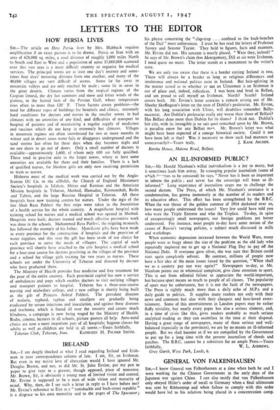AN ILL-INFORMED PUBLIC ?
Sm,—Mr. Harold Nicolson's wilful individualism is a joy to many, but it sometimes leads -him astray. In scourging popular journalism (some of which r'---7ves to be censured) he says, " Never has it been so important to inform the public ; and never has the sovereign will been so ill- informed." Long experience of journalism urns me to challenge the second dictum. The Press, of which Mr. Nicolson's utterance is a condemnation, has grown immensely in the number of its readers and its educative effect. This effect has been strengthened by the B.B.C. When the war threat of the golden summer of 1914 darkened over us; how many people understood the issues? Very few could have told you who were the Triple Entente and who the Triplice. To-day, in spite of exasperatingly small newspapers, our foreign problems are better understood. For instance, most people to-day have some notion of the causes of Russia's varying policies, a subject much discussed in mills and workshops.
When economic depression increased between the World Wars, many people were as foggy about the size of the problem as the old lady who repeatedly implored me to get up a National Flag Day to pay off the National Debt. If everyone gave silver, she was sure that Britain could start again completely solvent. By contrast, millions of people now have a fair idea of the main issues raised by the question, " When shall we as a country pay our way again?" Newspapers to-day, as Mr. Nicolson points out in whimsical complaint, give close attention to sport. This is not from editorial failure to appreciate the world-important, but because sport means so much to people of all classes. The popularity of sport may be unfortunate, but it is not the fault of the newspapers. The Press is rightly much more than a daily echo of M.P.s and a daily guide to politics. It supplies many readers not only with their news and comment but also with their cheapest and best-loved enter- tainment. Some of this entertainment in London papers may be rather fluffy triviality, but nearly every paper has also a serious element, and, in a time of crisis like this, gives readers probably as much serious analytical reading as they can assimilate in the time at their disposaL Having a great range of newspapers, many of them serious and well- balanced (especially in the provinces), we are by no means an ill-informed people. But we shall become so if we are compelled by the Government to put up for a long time with the present journalism of shreds and patches. The B.B.C. cannot be a substitute for an ample Press.—Yours
faithfully, W. L. ANDREWS. Grey Garth, West Park, Leeds, 6.


































 Previous page
Previous page